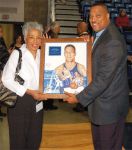In Shakespeare’s words, “There is nothing either good or bad, but thinking makes it so.”
It was a thought that first created the cellular telephone, made airplanes and created this ink. But it was the thinking of the Creator who designed a man like the late Chuck Cooper.
Cooper, a Pittsburgh native who attended Westinghouse High School, attended West Virginia State prior to enrolling at Duquesne University following World War II. While at Duquesne, Cooper captained the 1949-50 squad to a No. 6 national ranking on his way to earning All-American honors.
“He was such a great player, so athletic and so smooth that we called him Silk,” said John “Long-John” Barry, who was a teammate of Cooper’s and is also in the Duquesne Basketball Hall of Fame. “His roommate was Ed Dohler and he had nothing but great things to say about Chuck. What a gentleman.”
Duquesne defeated Savannah State, 58-44, in the inaugural Chuck Cooper Classic Dec. 5 at the A.J. Palumbo Center.
The one-day tournament, presented by PNC Bank, was designed to honor the legacy of former Duquesne star Chuck “Tarzan” Cooper, the first Black player drafted by an NBA team.
The racial climate in America was a lot different in the late ’40s than it is today, but Cooper and Duquesne University would not be denied.
“We went on the road to play Kentucky and Chuck Cooper and our trainer Blue Jackson had to stay at another hotel and they could not eat with the team,” said Barry. “Then Chuck went out and to this day played the best game ever by a Black player against Kentucky.”
In 1950, Cooper became the first African-American drafted into the NBA when the Boston Celtics selected him in the second round. Earl Lloyd, a ninth-round pick of the Washington Capitols in 1950, attended the game on Saturday.
“The owner of the Celtics, Walter Brown, said I don’t care what color he is. I don’t give a damn if he’s striped or plaid or polka-dot, Boston’s going to take Charles Cooper of Duquesne,” said “Cooper’s son, Chuck III, who played basketball at Schenley High School, CCAC and the Connie Hawkins Summer Basketball League. “Earl Lloyd always said that if Boston didn’t draft my dad that Washington would never have drafted him.”
How did coach Red Auerbach and his star guard Bob Cousy feel about traveling with a Black player?
“My dad and Bob Cousy were very good friends,” said Cooper III. “My dad loved music and would take Cousy to a lot of jazz clubs and concerts. Bob Cousy always said that race was not an issue winning was.”
Cooper’s six-year NBA career was cut short after he injured his back in a car accident. It was now time for him to get on with his life’s work.
He was named head of the city’s parks and recreation department in 1970, becoming Pittsburgh’s first Black department director. Later, he moved into an urban affairs post at Pittsburgh National Bank, where he spearheaded development and affirmative action programs.
“I played football, basketball and tennis at Tarentum High School in New Kensington,” said Joe Guyaux, president of PNC Financial Services. “A player that we all looked up to was Valley High School’s star quarterback Willie Thrower, who was the NFL’s first Black quarterback. Our community is very proud of both Willie and Chuck.
“We have a lot of ties. Chuck Cooper played at Duquesne and worked for PNC Bank and I served on the board at Duquesne for 11 years. A lot of the affirmative action policies that Chuck spearheaded we are still using today.”
Cooper died Feb. 5, 1984 and when a special video presentation and tribute to his ground-breaking achievements was played at half time there was not a dry eye in the place.
“Silk” Cooper was a champion on the court. A champion for diversity in the workplace. A champion dad, husband and as a war veteran he is and will always be a champion for our country.
Why do the good die young?
